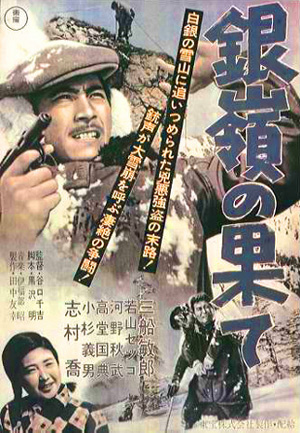 Snow Trail (1947) is a milestone film for students of Japanese cinema, chiefly as it marks the screen debut of one Toshiro Mifune. Scripted by Akira Kurosawa and directed by his childhood friend and lesser-talented fellow Toho director Senkichi Taniguchi, it is not an outstanding film, but as you've no doubt gathered by now, there are some outstanding things in it.
Snow Trail (1947) is a milestone film for students of Japanese cinema, chiefly as it marks the screen debut of one Toshiro Mifune. Scripted by Akira Kurosawa and directed by his childhood friend and lesser-talented fellow Toho director Senkichi Taniguchi, it is not an outstanding film, but as you've no doubt gathered by now, there are some outstanding things in it.Most remarkable by far is the performance of Takashi Shimura. Of course a remarkable performance from this legendary actor isn't remarkable in itself, as he gave so many: an embarrassment of riches. Here, he's a bank robber on the lamb with his younger and far less nice partner in crime (Mifune). They're stalking about in the Japanese alps. Why they decided to head there is never explained, but it makes for many a beautiful scenic vista (and much trudge-based plot padding). The two men (there was a third but he fell down a ravine) find themselves in a remote lodge with a kindly old man, his charming granddaughter, and a cheerful local mountain climber. They're all snowed in and there's nothing for it but to sit and wait. Shimura's heart begins to thaw in this compassionate company; Mifune's hardens. While the older crook sips sake and moons paternally over the girl, his angry young cohort spends his time cleaning his gun and counting his loot. Tensions mount. Something's gotta give ...
As I say, the film belongs to Shimura. The Spencer Tracy of Japanese film, he could say it all with a mere gesture. A more natural actor you'll never find, nor a more versatile one. From the battle-hardened Sengoku warrior of Seven Samurai to the cancer-riddled bureaucrat in Ikiru and all points in between, Shimura's every turn was perfection. In Snow Trail, he undergoes a transformation of character upon which hangs the rest of the picture. Everything else is fairly cookie-cutter, including Mifune's rather two-dimensional heavy. However, even in this comparatively unrewarding role, we see a Mifune already nearly fully-formed. His pent-up tension, his flashes of rage, his body language; he's a natural. Watching his performance, it's possible to grok with a then-37-year-old Akira Kurosawa and his determination to get this hot new talent on a set of his own (which he promptly did with the following year's Drunken Angel).
And the rest, as they say, (as they say) is history.


1 comment:
Sounds good. Hadn't heard of it before, but I'd like to see this one at some point in the future.
Post a Comment